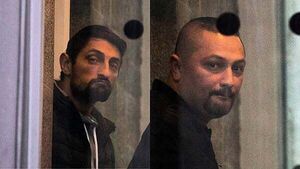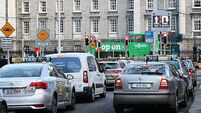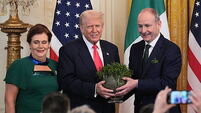Fear of self-incrimination reasonable excuse for withholding information on Ashling Murphy murder, jury told

Ryan Dunne
The brothers of Jozef Puska, who are charged with withholding information about the murder of schoolteacher Ashling Murphy, may have had the reasonable excuse of not wanting to incriminate themselves, a jury has been told.
Ms Justice Caroline Biggs told the jury at the Central Criminal Court that attempting to protect a family member is not a reasonable excuse for withholding information from the gardaí, but the jury must consider if the fear of self-incrimination operated on the minds of Lubomir Puska Jnr (38) and Marek Puska (36).
Jozef Puska murdered 23-year-old Ms Murphy by stabbing and slashing her neck after attacking her while she exercised along the canal towpath outside Tullamore on the afternoon of January 12th, 2022.
A jury later convicted him of that murder, and he is serving a life sentence.
His brothers, Lubomir Jnr and Marek Puska, are charged with withholding information.
Their wives, Viera Gaziova (40) and Jozefina Grundzova (32), are charged with impeding the apprehension or prosecution of Jozef Puska by burning his clothes.
All the accused were living with Jozef Puska, his wife Lucia, and 14 children at Lynally Grove, Mucklagh, Co Offaly, when the offences are alleged to have occurred in January 2022.
All accused have pleaded not guilty to all charges.
In her charge to the jury on Wednesday, Ms Justice Biggs said that the statements of the accused are the foundation of the prosecution case, with the defence relying on extracts of those interviews.
She said that if the jury accepts the defence case as was put to them, they must acquit, but even if they are disinclined to believe the defence case but still think that it might reasonably be true, they must acquit. She said that even if the jury disregards the defence case, they still must look at the prosecution case.
Moving on to the elements of the offence against Marek and Lubomir Jnr, Ms Justice Biggs said that the jury must first be satisfied that a serious offence had been committed, in this case murder; that this offence was committed by a person other than the accused; and that the accused had information of material assistance in apprehending Jozef Puska.
She said it was for the jury to determine what would have been of material assistance, which was information that might help the gardaí to build a case.
Ms Justice Biggs reminded the jury that the prosecution allege that Marek did not give information that Jozef had returned home on the night of Ms Murphy’s murder with visible injuries, that Jozef admitted to killing or seriously injuring a female with a knife, that Marek was aware of an arrangement to burn the clothes worn by Jozef, and that Jozef subsequently travelled to Dublin.
She said that the prosecution case against Lubomir Jnr was similar, except for the fact that there was no allegation that he was aware of an arrangement to burn the clothes. She went on to say that the prosecution alleged that the accused did not provide that information to the gardaí as soon as reasonably practicable.
Ms Justice Biggs next told the jury that the prosecution must prove that the two brothers had no reasonable excuse for not disclosing this information, adding that an attempt to protect a family member is not a reasonable excuse.
She said what is reasonable is the issue of self-incrimination, urging the jury to consider if there was any evidence supporting the submission put forward by the defence that the accused had this reasonable excuse.
She told the jury to focus on whether this fear operated in the minds of the accused at the time of their failure to disclose the information.
Ms Justice Biggs told the jury that if they feel that the assertion of a risk of self-incrimination is fanciful, they do not have to accept it.
Moving on to the case against Viera Gaziova and Jozefina Grundzova, Ms Justice Biggs said that the jury must be satisfied that the two accused knew or believed Jozef to be guilty of the offence of murder or some other arrestable offence.
She said that the jury must be satisfied that, with that knowledge, the two women committed an act without reasonable excuse, namely burning the clothes of Jozef Puska or assisting in the burning of the clothes, and they did so with the intention of impeding his apprehension or prosecution.
In her closing speech, prosecutor Anne Marie Lawlor SC told the jury that Marek and Lubomir Jnr knew what Jozef had done shortly after 9:30pm on the night of the murder because Jozef told him.
Despite this, Ms Lawlor said Marek and Lubomir Jnr failed to disclose vital information when they spoke to gardaí. Their wives burned Jozef's clothes to impede his arrest or prosecution, she said.
Ms Lawlor told the jury that there is an onus to provide information about serious offences such as murder. When Viera and Jozefina burned Jozef's clothes, "they knew why they were doing it," Ms Lawlor said, and acted without any reasonable excuse.
In her statements to gardaí, Viera said she burned the clothes after Lubomir told her that Jozef wanted them to be burned. However, Ms Justice Biggs has told the jury that what one accused person says about another is not evidence against that person.
Defence counsel Karl Finnegan SC told the jury that Marek Puska was entitled to remain silent to avoid incriminating himself. Mr Finnegan said there was a real risk that the information his client had could implicate him in an offence of assisting his brother after the murder.
Mr Finnegan also asked the jury to consider the possibility that Marek did not believe his brother had stabbed Ashling Murphy to death when he spoke to gardai two days after the murder.
He said the legislation regarding withholding information was introduced following the Omagh bombing to force people with knowledge of that atrocity to come forward.
However, Mr Finnegan said, the legislation does not remove a person's right to remain silent if they believe that they could incriminate themselves. At the time, Mr Finnegan said, there was a real risk that his client would be arrested for assisting Puska after the murder by arranging to get him out of Tullamore or because he knew of the plan to burn Jozef's clothes.
Kathleen Leader SC, for Lubomir Jnr, said her client delayed but did not withhold information. She said he had a reasonable excuse for the delay and asked the jury to consider the "natural sense of protection for his younger brother".
Paul Murray SC, for Ms Grundzova, told the jury that for his client to be guilty, the jury must be satisfied that she knew what Jozef had done when she helped Ms Gaziova to burn the clothes.
When his client burned Puska's clothes, she did not have any of the evidence that would later prove Jozef's guilt, Mr Murray said.
Damien Colgan SC, for Ms Gaziova, told the jury that the "crux of the case" is whether his client knew that Jozef Puska had stabbed Ms Murphy. Her view at that time, Mr Colgan said, was that Jozef had been the victim of an assault.
The jury of seven men and five women will continue their deliberations on Thursday.




